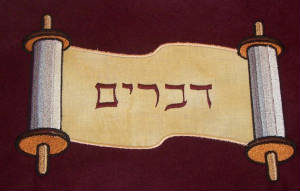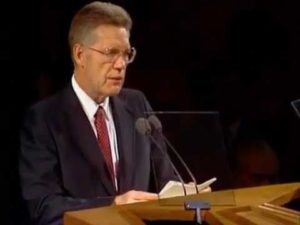They will not Search Knowledge, Nor Understand Great Knowledge. Part 1
We Have all The Spiritual Gifts and Tools
As a Latter-day Saint, it’s all too easy to become a bit complacent in our discipleship, and I would suppose that it has something to do with all the plentiful gospel tools that God has gifted and surround us with. Because we have precious testimonies;  because we have prophets, apostles, and temples; because we have been given all the spiritual gifts and tools the Lord has given in any other dispensation of time to bring us into His perfection; it is indeed a challenge not to take it all for granted and to remain hungry for more gospel knowledge and even more pronounced spiritual blessings. As long as we attend church regularly, carry a current temple recommend and use it, listen to and read the words of modern prophets, always try to overcome a number of our sins and weaknesses, it’s easy to believe we are meeting the Lord’s expectations in our individual mortal journeys. But, a nagging question still remains, “have we done all we can?” My questions are not intended to make one feel depressed or hopeless, but instead, to cause each one of us to the sobering question: “Are we taking advantage of the weightier opportunities the FULLNESS of the gospel provides for us? Are we taking the advantages the Lord anticipates for us?” I believe that if we understood more about the gospel, no one would feel hopeless, but rather, it should leave us all feeling a great measure of hope in our salvation and our Savior’s rehabilitating power to change us with a “mighty change.” (Alma 5:12-14)
because we have prophets, apostles, and temples; because we have been given all the spiritual gifts and tools the Lord has given in any other dispensation of time to bring us into His perfection; it is indeed a challenge not to take it all for granted and to remain hungry for more gospel knowledge and even more pronounced spiritual blessings. As long as we attend church regularly, carry a current temple recommend and use it, listen to and read the words of modern prophets, always try to overcome a number of our sins and weaknesses, it’s easy to believe we are meeting the Lord’s expectations in our individual mortal journeys. But, a nagging question still remains, “have we done all we can?” My questions are not intended to make one feel depressed or hopeless, but instead, to cause each one of us to the sobering question: “Are we taking advantage of the weightier opportunities the FULLNESS of the gospel provides for us? Are we taking the advantages the Lord anticipates for us?” I believe that if we understood more about the gospel, no one would feel hopeless, but rather, it should leave us all feeling a great measure of hope in our salvation and our Savior’s rehabilitating power to change us with a “mighty change.” (Alma 5:12-14)
We Must First Acquire Gospel Knowledge
 As we continue these blogs, we will address this cardinally critical subject with much greater detail, but for now, let’s evaluate our individual responsibility (and blessing) to acquiring all the knowledge and understanding we can about God’s plan of salvation. Though we may feel we already have enough to sustain our own testimonies, do we really? What if the brethren made a drastic decision that affects the entire church in a way you don’t agree with? Could you deal with it? From a totally different perspective, does an all-knowing God respect us when we treat lightly the things (Hebrew devarim, meaning words) He has given us to learn from? Would He give us a “A” or an “F” or
As we continue these blogs, we will address this cardinally critical subject with much greater detail, but for now, let’s evaluate our individual responsibility (and blessing) to acquiring all the knowledge and understanding we can about God’s plan of salvation. Though we may feel we already have enough to sustain our own testimonies, do we really? What if the brethren made a drastic decision that affects the entire church in a way you don’t agree with? Could you deal with it? From a totally different perspective, does an all-knowing God respect us when we treat lightly the things (Hebrew devarim, meaning words) He has given us to learn from? Would He give us a “A” or an “F” or something in between for our gospel studies? Do we have enough knowledge of the restored gospel to effectively communicate it to our neighbors, our friends, and other family members who are open-minded, but unfamiliar with our beliefs or why we believe the way we do? Could we compassionately, but boldly, address the many opposing concerns held by ministers or other religious potentates that could actually help them understand our perspectives better? And, a question that’s even much more disturbing, but all too common now days: “Do we have enough knowledge and understanding to help open-minded loved ones find their way back when their testimonies are waning or have failed them altogether?”
something in between for our gospel studies? Do we have enough knowledge of the restored gospel to effectively communicate it to our neighbors, our friends, and other family members who are open-minded, but unfamiliar with our beliefs or why we believe the way we do? Could we compassionately, but boldly, address the many opposing concerns held by ministers or other religious potentates that could actually help them understand our perspectives better? And, a question that’s even much more disturbing, but all too common now days: “Do we have enough knowledge and understanding to help open-minded loved ones find their way back when their testimonies are waning or have failed them altogether?”
Defending our Faith
 If the occasion presented itself, could we teach or defend our faith to virtually anyone, particularly the honest in heart? Or, are we often left with one tool only, to bear an honest and sincere testimony? Please don’t get me wrong, a burning testimony is a wonderful and powerful tool and gift from God, but it needs constant nurturing that it may be intensified. It is true that testimonies may carry the power to touch another’s heart; but, just for a moment, consider how valuable and helpful it would be if, coupled with a powerful testimony, we became so familiar with gospel truths, that we are able to articulate doctrinal explanations that address concerns over doctrinal differences with anyone of another faith? Wouldn’t it be helpful to have enough knowledge of the plan of salvation to add to another’s faith, rather than simply leaving them dangling upon our testimonies alone? Bearing pure testimony is indeed a powerful tool often exercised by prophets. But, in order to help educate and fill one’s soul, they almost always include powerful evidences supporting their convictions and beliefs.
If the occasion presented itself, could we teach or defend our faith to virtually anyone, particularly the honest in heart? Or, are we often left with one tool only, to bear an honest and sincere testimony? Please don’t get me wrong, a burning testimony is a wonderful and powerful tool and gift from God, but it needs constant nurturing that it may be intensified. It is true that testimonies may carry the power to touch another’s heart; but, just for a moment, consider how valuable and helpful it would be if, coupled with a powerful testimony, we became so familiar with gospel truths, that we are able to articulate doctrinal explanations that address concerns over doctrinal differences with anyone of another faith? Wouldn’t it be helpful to have enough knowledge of the plan of salvation to add to another’s faith, rather than simply leaving them dangling upon our testimonies alone? Bearing pure testimony is indeed a powerful tool often exercised by prophets. But, in order to help educate and fill one’s soul, they almost always include powerful evidences supporting their convictions and beliefs.
What Does God Expect
 So, with all this said, what does God expect of us when it comes to obtaining gospel knowledge? Well, for beginners, it goes without debate that knowledge is one of His main attributes. It is obviously part of what makes Him God. But, does He expect us to acquire great knowledge, or is it good enough to simply believe in the gospel and its restoration? Let’s take a look at just a few scriptures that may help answer this question. Nephi acknowledged that man’s tendency is to dismiss much and to “cast many things [words] away which are written and esteem them as things [words] of naught. But I, Nephi, have written what I have written, and I esteem it as of great worth.” (2 Nephi 33:2-3; [Words]: Hebrew definition for “things” added by me; See also 1 Nephi 19:7; 2 Nephi 25:8)
So, with all this said, what does God expect of us when it comes to obtaining gospel knowledge? Well, for beginners, it goes without debate that knowledge is one of His main attributes. It is obviously part of what makes Him God. But, does He expect us to acquire great knowledge, or is it good enough to simply believe in the gospel and its restoration? Let’s take a look at just a few scriptures that may help answer this question. Nephi acknowledged that man’s tendency is to dismiss much and to “cast many things [words] away which are written and esteem them as things [words] of naught. But I, Nephi, have written what I have written, and I esteem it as of great worth.” (2 Nephi 33:2-3; [Words]: Hebrew definition for “things” added by me; See also 1 Nephi 19:7; 2 Nephi 25:8)
The prophet Joseph Smith taught that a man is saved no faster than he gets knowledge. (TPJS. p 217) In Proverbs we read: “Give instruction to a wise man, and he will be yet wiser: teach a just man, and he will increase in learning.” (Proverbs 9:9; bracketed words included by me) Are we eager to mine scriptural knowledge by excavating more gospel ore through the Spirit, or are do we feel to relax where we currently are; wherever our testimonies sit individually? To the church of Corinth, Paul taught: “But God hath revealed them unto us by his Spirit; for the Spirit searcheth all things, yea, the deep things of God.” (1 Corinthians 2:10-11; bracketed words mine; emphasis added) Did you catch that? The Spirit searcheth ALL THINGS (all words), yes, the DEEP THINGS (deep words) of God. Do we allow the Spirit to take us THERE?
The Lessor Portion of the Word or the Greater Portion of the Word

Why should any Latter-day Saint feel to put off learning the DEEPER words of God for another time or sphere of existence, simply because we have membership in His church? I have a membership at a local fitness center; but, does my membership guarantee that I’m physically fit? Why would we feel to relax around the shallow end of the gospel pool, where only a LESSER portion of the word is found, when so much more is required and available for our enjoyment? Is it because we are afraid of what the Lord may require of us, so we symbolically hide that particular talent deep into the soil? (See Matthew 5:14-25) Why shouldn’t we venture outward towards the boundless waters where the deep things are found; yea, even hidden things which no man knew? (See D&C 101:32-34) The deeper things of God won’t be found in the repetitive ripples of waters at the shallow end of the gospel bay. They will only be found in the depths of the gospel sea, where boundless faith carries us towards spiritually led currents.
The Shallow Gospel Bay or the Expansive Seas of His Mysteries?
 To put it short, those who persist in only the lesser portion of the word, those who routinely relax their gospel intellect, as though they are shipwrecked, around the seemingly safer end of the gospel bay, will miss the wide expansive seas of the thought-provoking, deeper things of God—even the
To put it short, those who persist in only the lesser portion of the word, those who routinely relax their gospel intellect, as though they are shipwrecked, around the seemingly safer end of the gospel bay, will miss the wide expansive seas of the thought-provoking, deeper things of God—even the hidden mysteries of His kingdom. Nephi laments over this reality and throws caution to us in the latter-days. Revealing his heart’s poignant thoughts, he writes: “I am left to mourn . . . for they will not search knowledge, nor understand great knowledge, when it is given unto them in plainness.” (2 Nephi 32:7) We remain ignorant still when we refuse to search knowledge or try to understand great knowledge. Again, why does Nephi mourn? Because, humanity generally and naturally persists in ignorance or unbelief. This condition causes a lack of faith and a state of wickedness! The Lord’s counsel to hunger and thirst after His righteousness is therefore declined when we become complacent or vain in our individual or collective standing with God! (Matt 5:6) We refuse to walk with Isaiah, Paul, Abraham, Joseph Smith, and many others who tenaciously sought for greater knowledge; knowledge of the deepest complexities and the broadest understandings; knowledge that would save them and lead them into the presence of God. If our sights are set on exaltation, than we are born to sail!
hidden mysteries of His kingdom. Nephi laments over this reality and throws caution to us in the latter-days. Revealing his heart’s poignant thoughts, he writes: “I am left to mourn . . . for they will not search knowledge, nor understand great knowledge, when it is given unto them in plainness.” (2 Nephi 32:7) We remain ignorant still when we refuse to search knowledge or try to understand great knowledge. Again, why does Nephi mourn? Because, humanity generally and naturally persists in ignorance or unbelief. This condition causes a lack of faith and a state of wickedness! The Lord’s counsel to hunger and thirst after His righteousness is therefore declined when we become complacent or vain in our individual or collective standing with God! (Matt 5:6) We refuse to walk with Isaiah, Paul, Abraham, Joseph Smith, and many others who tenaciously sought for greater knowledge; knowledge of the deepest complexities and the broadest understandings; knowledge that would save them and lead them into the presence of God. If our sights are set on exaltation, than we are born to sail!
God Works According to the Measure of our Faith and How Well We Listen
It’s sad, but true, that so many refuse to walk where those with exceedingly great faith have trod. The prototypical Abraham said: “And, finding there was greater happiness and peace for me, I sought for the blessings of THE fathers [not HIS fathers], and the right whereunto I should be ordained to administer the same; having been myself a follower of righteousness, DESIRING also to be one who possessed GREAT KNOWLEDGE, and to be a GREAT follower of righteousness, and to possess A GREATER KNOWLEDGE, . . .” (Abraham 1:2; emphasis added)
Abraham said: “And, finding there was greater happiness and peace for me, I sought for the blessings of THE fathers [not HIS fathers], and the right whereunto I should be ordained to administer the same; having been myself a follower of righteousness, DESIRING also to be one who possessed GREAT KNOWLEDGE, and to be a GREAT follower of righteousness, and to possess A GREATER KNOWLEDGE, . . .” (Abraham 1:2; emphasis added)  How well we LISTEN (Hebrew shama) and how much we really hear INTELLIGIBLY really boils down to the strength of our faith and desire to learn more and to obey. Do we want to feast or nibble? It becomes apparent that God expects us to feast upon His words, rather than nibble, and also to understand His words through the tutelage of the Spirit! We have all the needful tools: We have prayer! We have been given the gift of the Holy Ghost! We have the scriptures, particularly the Book of Mormon! And we have the words of modern prophets who inspire and lift us! We have all we need to learn and EXPERIENCE so much more, if we would but put into practice a greater individual effort. How much of our time is spent on our own kingdoms, or relaxation, or entertainment? Could our knowledge and testimonies be greatly intensified if we worked a little less and sought for a little less entertainment and rest and relaxation? I believe it could … actually … I know it would!
How well we LISTEN (Hebrew shama) and how much we really hear INTELLIGIBLY really boils down to the strength of our faith and desire to learn more and to obey. Do we want to feast or nibble? It becomes apparent that God expects us to feast upon His words, rather than nibble, and also to understand His words through the tutelage of the Spirit! We have all the needful tools: We have prayer! We have been given the gift of the Holy Ghost! We have the scriptures, particularly the Book of Mormon! And we have the words of modern prophets who inspire and lift us! We have all we need to learn and EXPERIENCE so much more, if we would but put into practice a greater individual effort. How much of our time is spent on our own kingdoms, or relaxation, or entertainment? Could our knowledge and testimonies be greatly intensified if we worked a little less and sought for a little less entertainment and rest and relaxation? I believe it could … actually … I know it would!
 Elder Bruce R. McConkie penned the following:
Elder Bruce R. McConkie penned the following:
“And thus, the Lord says to the saints in our day: ‘Your minds in times past have been darkened because of unbelief, and because you have treated lightly the things you have received—which vanity and unbelief have brought the whole church under condemnation.’ Is the Lord telling us we are guilty of sin if we do not believe the doctrines he has given us? If we treat lightly—neither reading, nor pondering, nor obeying—the revelations he has given us, are we guiltless? … Is it a sin to have the Book of Mormon and do nothing about it? [T]o use it neither for our own guidance nor as a means of presenting the message of the restoration to the world?
“Is it not a sin to walk in darkness when we have light? Is it not a sin to hold the holy priesthood and do nothing about it? ‘There are many ordained among you,’ the Lord says to his saints, ‘whom I have called but few of them are chosen. They who are not chosen have sinned a very grievous sin, in that they are walking in darkness at noon-day … If you keep not my commandments, the love of the Father shall not continue with you, therefore you shall walk in darkness.’
“Oh, what a grievous thing it is to receive the light of heaven and yet walk in darkness! As Jesus said to certain people in his day: ‘If ye were blind, ye should have no sin: but now ye say, We see; therefore your sin remaineth.’ (John 9:41)” (A New Witness for the Articles of Faith, pp 226-227; emphasis added)
 Can our Minds be Inflated and our Pursuits Vein?
Can our Minds be Inflated and our Pursuits Vein?
Isn’t it interesting that the Lord used the word vanity to describe the reason for this condemnation. Vanity explains our disinterest and treating lightly the things (words) He has given, particularly the Book of Mormon and other scriptures. In the 1828 Noah Webster’s Dictionary (the dictionary of the prophet Joseph’s day), the suitable definition for the word vanity is: a fruitless desire or endeavor; trifling labor that produces no good; emptiness; empty pleasure, vain pursuit, idle show; ostentation, arrogance; inflation of mind upon slight grounds, empty pride inspired by an overweening conceit of one’s personal attainments or decorations.” As members of the Lord’s only living church, should we be asking ourselves if the Lord still considers us vain? Are we still under the same condemnation the Lord placed the early saints? Do we STILL treat lightly the things (the words) the Lord has given us? If this is true, than by definition of the word vanity, our desires and endeavors may actually be fruitless when it comes to our salvation; our works may actually be idle, our pursuits vain, our endeavors by-and-large fruitless. From the Lord’s perspective, does He still consider us ostentatious and arrogant? Are our minds inflated upon slight grounds, inspired by an overweening conceit of personal attainments or decorations? These are harsh and depressing questions, but are they fair, appropriate, and needful for every generation of members, especially when so much has been given to us from the Lord? Each individual member must answer this for themselves.
A Cake Half-Baked
One thing is certain: as we feast upon the scriptures and seek for greater knowledge, the Holy Ghost will carry our faith into the depths of God’s salvation—into the FULLNESS of His gospel where His mysteries are revealed.  But, when we learn about and accept only a portion of the word, we are like a cake that the prophet Hosea described as being, spiritually “not turned” (Hebrew idiom for “half-baked”). (See Hosea 7:8) Either we play the role of the vigilant bride, learning and understanding His marriage contract, or we don’t. We can either settle only upon our belief that the gospel is true and in the end, having only become a half-baked cake, or we will invite and allow the Spirit to carry us to the depths of learning and, in the end, become a fully- baked cake. The choice is always a personal one that only each bride makes for his or herself.
But, when we learn about and accept only a portion of the word, we are like a cake that the prophet Hosea described as being, spiritually “not turned” (Hebrew idiom for “half-baked”). (See Hosea 7:8) Either we play the role of the vigilant bride, learning and understanding His marriage contract, or we don’t. We can either settle only upon our belief that the gospel is true and in the end, having only become a half-baked cake, or we will invite and allow the Spirit to carry us to the depths of learning and, in the end, become a fully- baked cake. The choice is always a personal one that only each bride makes for his or herself.
Joseph said: “The things of God are of deep import; and time, and experience and careful and ponderous and solemn thoughts can only find them out. Thy mind O man! If thou wilt lead a soul into salvation, must stretch as high as the utmost heavens, and search into and contemplate the darkest abyss, and the broad expanse of eternity—thou must commune with God.” (History of the Church Vol. 3, p 295; emphasis mine) If we are to lead ourselves and other souls into the fullness of God’s salvation; to commune with God, we need to be vigilant in searching and researching. We need to be alert, careful, and ponderous. We should have spiritual and solemn thoughts often, that we can develop a great understanding of God’s salvation. We should be willing to contemplate the broad expanse of eternity; which He apparently hides from those who merely frolic around on surface waters. Was Joseph, who was and is the president of this dispensation, misguiding the saints with an unrealistic expectation? Until the day he died, and with a certain measure of encouragement and frustration, he tried to pack greater light and understanding into the hearts and minds of the often complacent, unwilling, or preoccupied saints. (History of the Church, Vol 6:184-185) He encouraged the saints onward, to receiving personal revelation for themselves—even to a sure knowledge of God and His son. (TPJS, p 331)
KNOWLEDGE is POWER
 We are told that knowledge is power, and that knowledge keeps us from confusion. Again, said Joseph: “Knowledge does away with darkness, suspense and doubt; for these cannot exist where knowledge is . . . In knowledge there is power. God has more power than all other beings, because He has greater knowledge.” ( TPJS, pp 287-288) We should understand that one of God’s attributes is knowledge. Do we, subconsciously or even consciously, avoid or spurn acquiring all we can of it?
We are told that knowledge is power, and that knowledge keeps us from confusion. Again, said Joseph: “Knowledge does away with darkness, suspense and doubt; for these cannot exist where knowledge is . . . In knowledge there is power. God has more power than all other beings, because He has greater knowledge.” ( TPJS, pp 287-288) We should understand that one of God’s attributes is knowledge. Do we, subconsciously or even consciously, avoid or spurn acquiring all we can of it?
Paul Counsels us to Mature From The Milk and Into The Meat of The Gospel
 Rather than a continuous diet of milk only (the foundational and fundamentals—a lessor portion of the word), Paul counsels the church to mature into the meat of the gospel. Accordingly, in his epistle to the Hebrews, Paul boldly pressed the members to mature in the gospel by advancing from the necessary milk to the also necessitating meat. If we fail to do so and focus only on the first principles of the gospel indefinitely (the things we should have learned during our initial conversion), he describes us as being unskillful in the word of righteousness; without maturity, and only a babe in the word. In all reality, we deadlock and stunt our spiritual growth towards Christ. Paul continues: “For when for the time ye
Rather than a continuous diet of milk only (the foundational and fundamentals—a lessor portion of the word), Paul counsels the church to mature into the meat of the gospel. Accordingly, in his epistle to the Hebrews, Paul boldly pressed the members to mature in the gospel by advancing from the necessary milk to the also necessitating meat. If we fail to do so and focus only on the first principles of the gospel indefinitely (the things we should have learned during our initial conversion), he describes us as being unskillful in the word of righteousness; without maturity, and only a babe in the word. In all reality, we deadlock and stunt our spiritual growth towards Christ. Paul continues: “For when for the time ye ought to be teachers, ye have need that one teach you again which be the first principles of the oracles [utterances: The original Greek word (logion) for oracles means: “an utterance of God.” Strong’s, G3051, p 45] of God; and are become such as have need of milk, not of strong meat. For everyone that useth milk is unskillful in the word of righteousness: for he is a babe. But strong meat belongeth to them that are full of age [mature], even those who by reason of use have their senses exercised to discern both good and evil.” (Hebrews 5:12-14; emphasis and racketed words I added) Isaiah asks two pointed questions and answers with a firm response: “Whom shall he teach knowledge? And whom shall he make to understand doctrine? Them that are weaned from the milk, and drawn from the breast.” (Isaiah 28:9 ;Original Italicized) We see, again and again, that the Lord gives more to those who seek it (knock, and it shall be given unto you); to those who reach beyond the fundamentals, or the lesser portion of the word.
ought to be teachers, ye have need that one teach you again which be the first principles of the oracles [utterances: The original Greek word (logion) for oracles means: “an utterance of God.” Strong’s, G3051, p 45] of God; and are become such as have need of milk, not of strong meat. For everyone that useth milk is unskillful in the word of righteousness: for he is a babe. But strong meat belongeth to them that are full of age [mature], even those who by reason of use have their senses exercised to discern both good and evil.” (Hebrews 5:12-14; emphasis and racketed words I added) Isaiah asks two pointed questions and answers with a firm response: “Whom shall he teach knowledge? And whom shall he make to understand doctrine? Them that are weaned from the milk, and drawn from the breast.” (Isaiah 28:9 ;Original Italicized) We see, again and again, that the Lord gives more to those who seek it (knock, and it shall be given unto you); to those who reach beyond the fundamentals, or the lesser portion of the word.